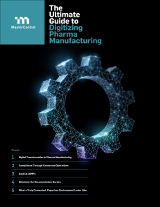
GxP Lifeline
Smart Technology Accelerates Biomanufacturing by Improving Reproducibility

Innovators in all areas of drug discovery – from big pharma, small biotech companies, biomanufacturing firms, and all types of organizations in between – are feeling the pressure to advance R&D drug candidates through the pipeline and deliver novel therapies to market. The immense pressure has forced many labs to reevaluate their internal processes and implement cutting-edge automation and process tools to speed innovation. Central to this is ensuring reproducibility of both processes and results. Modern tools can not only help screen candidates faster but working in tandem can create an emerging category of laboratory operations (LabOps) innovations that empower teams to achieve their goals in record time.
Over the past decade, many internet-of-things (IoT) tools, especially IoT 5.0 tools, have been developed to aid LabOps professionals in gaining operational and financial efficiencies. Marginal and exponential improvements can be gained through:
- Implementation of sensors that autonomously monitor and collect equipment data.
- Automated data analysis and advanced machine learning that provide meaningful insights.
- Visualization of equipment data, accessible via secure, cloud-based software.
While many vendors provide services to solve one area, customers are demanding both interoperability and more comprehensive, purpose-built platforms that helps teams in all these areas. As the industry expands and grows, innovative technology companies will provide better tools to meet these new challenges. Technology leaders like Elemental Machines are striving to streamline LabOps activities by complementing existing high-performance tools with application programming interface (API) integrations that connect systems and eliminate data silos. For instance, EM can securely send specific raw or processed data to the MasterControl software platform to manage electronic batch records (EBR) during quality control. Sophisticated digital tools like this will help automate data monitoring and capture, as well as the documentation of experimental protocols to ensure data fidelity and reliability.
Rising Costs of Bringing Drugs to Market
A recent report published in the Journal of the American Medical Association showed 47 companies developed and launched 63 new drug or biologics to market with an average cost of $985.3 million (95% CI, $683.6 million-$1228.9 million) per product.(1) This report verifies the high cost of R&D discovery and drug development. Furthermore, costs are estimated to increase by 9.6% by 2025, according to BCC Research.(2)
Another study published in Science showed that fewer than half of cancer experiments were able to be reproduced.(3) This alarming finding was partly attributed to incomplete reporting on methods and reagents but also partly due to the lack of transparent and communicative researchers.
Where Does This Leave the Biotech and Biomanufacturing Industry?
Changing human behavior is challenging, especially in this competitive landscape. Teams can take back control of their manufacturing processes and facilities by embracing innovative and purpose-built technologies.
In an effort to improve documentation and bring more control to the manufacturing space, technology leaders like Elemental Machines and MasterControl are partnering to provide teams with solutions that improve their ability to monitor and document crucial environmental conditions. This is just one example of how the combination of complementary tools streamlines previously manual and error-prone methods and provides enhanced documentation of equipment-specific data with an automated, live data feed between systems. A live data feed of this nature has many benefits, including:
- 1. Automated data capture that reduces the time and potential sources of error, such as when humans enter data manually.
- 2. Recorded historic data that equips users to see trends over time to detect deviations from baseline.
- 3. Creating alerts that mine real-time and historic data and deliver both onsite and online notifications through email or short message service (SMS) messaging.
The integration of advanced LabOps tools that provide much-needed novel functionality equips scientists, manufacturers, and LabOps with real-time and historic production data and insights. These actionable insights accelerate continuous improvements by optimizing manufacturing processes and improving product quality. Teams can also rest assured that they will meet their compliance requirements with accurate and reliable documentation.
As biomanufacturing facilities move to paperless, digital documentation solutions for speed, accuracy, and quality, flexible software platforms need to incorporate different processes and protocols. They also need to aggregate and import data from other systems so that staff can focus on their processes and document results effectively. It has become critical for LabOps teams to implement smart, compatible technologies that help reduce daily fire drills in the lab and allow teams to adopt more proactive, long-term views. This strategic mindset will help increase efficiency and reliability of protocols to accelerate drug discovery and development while accelerating scientific innovation.
References:
- “Estimated Research and Dvelopment Investment Needed to Bring a New Medicine to Market 2009-2018,” Oliver Wouters, Martin McKee, and Jeroen Luyten, JAMA, Mar. 3, 2020.
- “Drug Discovery Technologies,” BCC Publishing, Apr. 2021.
- “Investigating the replicability of preclinical cancer biology,” Timothy Errington, Maya Mathur, et al., eLife, Dec. 7, 2021.


